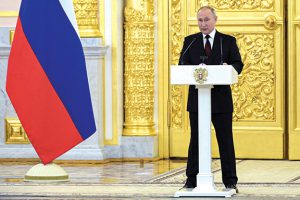According to Vladimir Putin, “true sovereignty of Ukraine is possible only in partnership with Russia.†Besides the delicious contradiction there, it shows how far the Russian president’s designs on Ukraine stretch beyond the gas pipelines that fueled previous crises. Yet if Russia does invade Ukraine (again), the effect on energy markets this winter is something Western countries will need to contend with.
The most obvious point of impact, one that obsesses Washington, is the roughly 40% of Europe’s gas imports that come from Russia. In the past, spats between Moscow and Kyiv would occasionally result in cutoffs because the pipelines run through Ukraine. But now the Nord Stream 2 project linking Russia directly with Germany has been built to avoid that. The US regards this as part of the Kremlin’s multidecade project to use gas as a weapon to divide European allies. For Germany, it’s a way to diversify supply routes to alleviate the risks that come with buying a lot of gas from Russia.
Putin is happy to exploit this tension between Washington and Berlin. There is little prospect of Nord Stream 2 being blocked, as much as the US would like to see that happen. The thing is all but built and awaits regulatory approval.
Europe’s gas market is already jittery, with storage tanks only 62% full — lower than the 80% average level for this time of year. When the Germans delayed their approval of Nord Stream 2 in November, already eye-watering European gas prices shot higher. Any threat by Germany to cut off extra gas supply to itself in this situation would be hollow. As Kevin Book of ClearView Energy Partners puts it: “Sawing towards the trunk while standing on a branch only happens in cartoons.â€
In voicing support for Ukraine this weekend, Germany’s new chancellor, Olaf Scholz, was careful to not put Nord Stream 2 directly on the block. His ambiguity echoes the joint declaration his predecessor made with the US in July.
This is the diplomatic equivalent of “we’ll see how it goes, shall we?†It’s worth noting that although the US might publicly press Germany to take a stand if Russia attacks, the defense budget bill passed in the House earlier this month contains no language targeting Nord Stream 2 with sanctions.
If anything, it is in Scholz’s interest to see the pipeline approved sooner rather than later. The longer it takes, the greater the risk that approval will be overtaken by some new Russian aggression in Ukraine. That would highlight Germany’s weakness and probably stoke divisions within both the coalition government and the European Union. And getting Nord Stream 2 off the table now might sideline an issue that has tended to dominate and divide trans-Atlantic energy discussions.
Rather than the Germans cutting off a gas pipeline that hasn’t even started up, might Russia stop the gas supply if faced with other countermeasures? That’s possible given Ukraine’s apparent existential importance to Putin. But condemning Europe to a mixture of hypothermia and recession this winter would unite his opponents, undoing the divisions he has managed to exploit thus far.
The symbiosis at the heart of the Russian-European gas relationship — the former needing money and expertise and the latter, heat and power — has kept it going for more than half a century, including during the Cold War. But Putin is now aggressively testing the bond. Even if the latest Ukraine tensions pass without incident, this year’s curiously timed depletion of Gazprom PJSC’s European storage tanks and Putin’s own bitter rhetoric against European energy-market liberalisation have probably done lasting damage.
—Bloomberg
Liam Denning is a Bloomberg Opinion columnist covering energy,
mining and commodities. He previously was editor of the Wall Street Journal’s Heard on the Street column and wrote for the Financial Times’ Lex column. He was also an investment banker
 The Gulf Time Newspaper One of the finest business newspapers in the UAE brought to you by our professional writers and editors.
The Gulf Time Newspaper One of the finest business newspapers in the UAE brought to you by our professional writers and editors.

